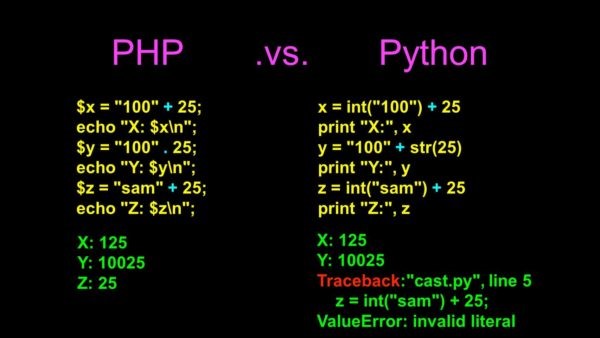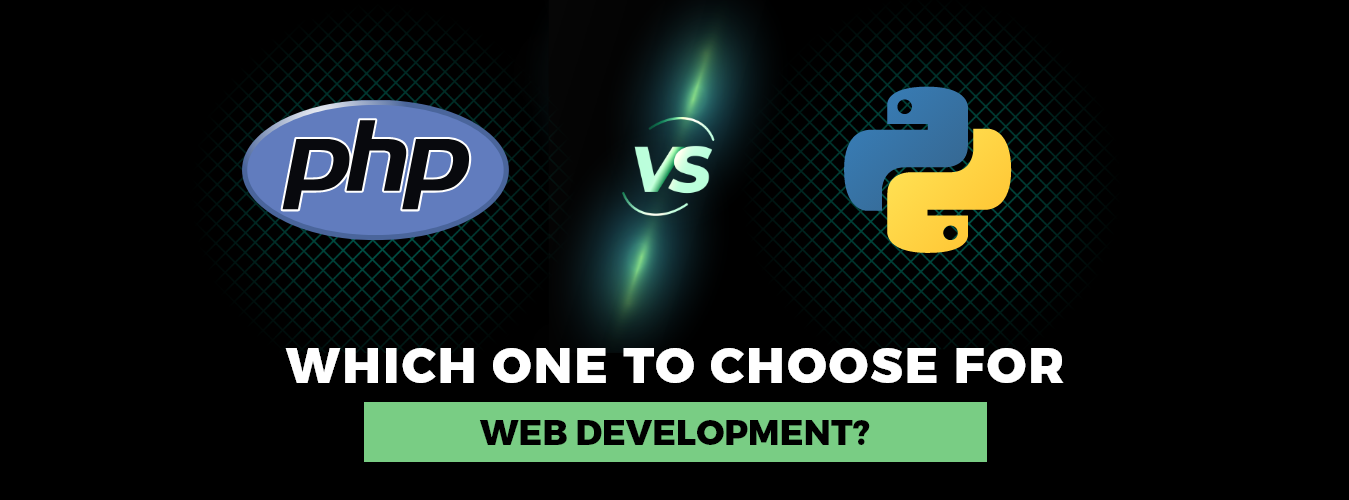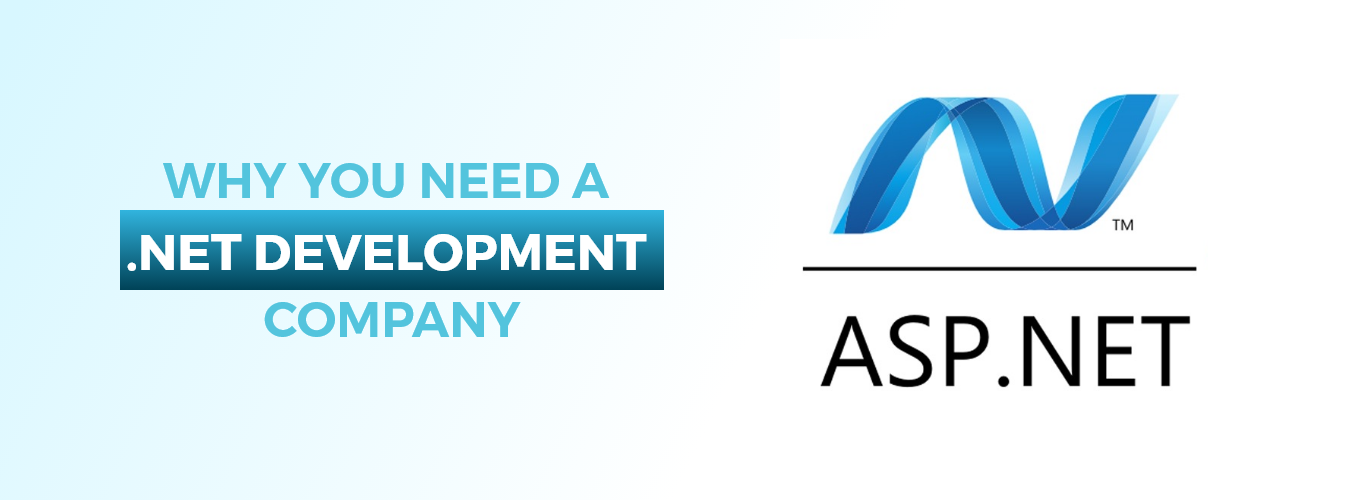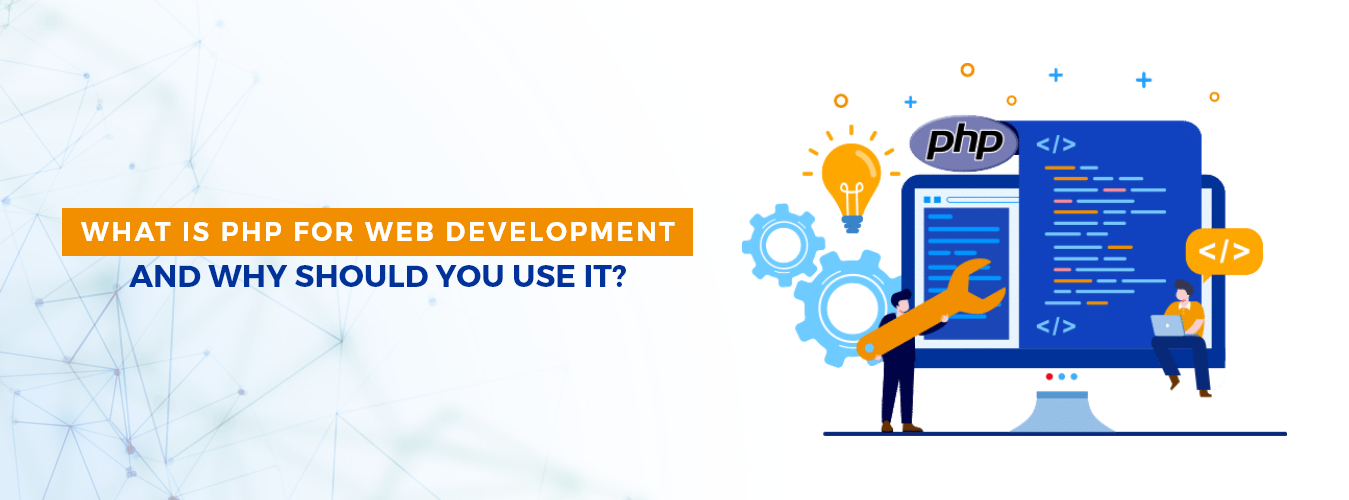Both PHP and Python are popular choices for web development, and each has its advantages. PHP is widely used for building server-side applications, particularly for creating dynamic web pages and content management systems. It is easy to learn, has a large community, and is well suited for smaller projects. On the other hand, Python is a versatile, general-purpose programming language used for web development, scientific computing, data analysis, artificial intelligence, and more. It has a large ecosystem of libraries and frameworks, including Django, Flask, and Pyramid, which make it easy to build complex and scalable web applications.
PHP vs Python: Which one to Choose for Web Development?
A brief Comparison of PHP & Python
Syntax
A programming language’s syntax refers to how the code is written and structured.
- PHP syntax is similar to other popular programming languages and is easy to learn for those with prior programming experience. PHP uses a mixture of C-style and Perl-style syntax, making it a familiar choice for many application development companies.
- On the other hand, Python syntax is known for its clean and readable style. The language was designed to be easy to read, making it a good choice for new programmers. The syntax uses indentation to denote code blocks, making the code structure clear and easy to understand.
Both PHP and Python have a syntax that is easy to learn for those with prior programming experience. However, Python’s clean and readable syntax is a good choice for new programmers, while PHP’s syntax is more familiar for those with prior programming experience.

Speed and Performance
When choosing a programming language for web development, speed and performance are important factors.
Regarding raw performance, PHP is generally faster than Python for small and simple web applications. PHP is optimized for web development and is designed to handle simple requests quickly.
- However, as the complexity of the application increases, PHP can become slower. On the other hand, Python is slower in raw performance but is better suited for handling complex applications. Python has a larger library of tools and libraries to optimize performance and is used for various applications, including scientific computing and data analysis.
- Regarding speed and performance, PHP is faster for small and simple web applications, while Python is better suited for complex and demanding applications. It’s important to consider the specific requirements of your project when choosing a programming language.
Web Frameworks
Web frameworks are pre-built packages of code that provide a structure for building web applications, making it easier and faster to develop complex applications.
- PHP has several popular web frameworks, including Laravel, CodeIgniter, and Yii, widely used for building complex web applications. These frameworks provide routing, database access, and security features, making building large and complex applications easier.
- Python also has several popular web frameworks, including Django, Flask, and Pyramid, widely used for building scalable and complex web applications. These frameworks provide features such as ORM, routing, and template engine, making it easy to build and maintain large and complex applications.
PHP vs Python, both have popular web frameworks that make it easier to build complex web applications. The choice of the framework will largely depend on the specific requirements of your project and your personal preferences.
Get Your Own Empowered Application Development
contact usSupport and Community
Both PHP and Python have large and active communities of developers, making it easy to find support and resources for both languages.
- For PHP, numerous online forums, documentation, and tutorials are available, as well as many open-source projects and libraries. PHP also has a well-established ecosystem, with many hosting providers and content management systems (CMSs) offering support for the language.
- On the other hand, Python has a reputation for having a friendly. Welcoming community and is often considered one of the most beginner-friendly programming languages. Python has a wealth of online resources and tutorials, as well as a large number of third-party libraries and frameworks.
In terms of support, both languages have strong backing from their respective communities, making it relatively easy to find help and resources when needed. Ultimately, the choice between PHP and Python will depend on your project’s specific needs and requirements.
Security
Both PHP and Python have security measures in place to help protect against potential security vulnerabilities. However, the security of a project built with either language largely depends on how the code is written and managed.
- For PHP, security best practices include keeping the code up-to-date, using secure passwords, avoiding the use of eval() and other dangerous functions, and properly validating and sanitizing user inputs. Many popular PHP frameworks, such as Laravel and Symfony, also include built-in security features.
- For Python, security best practices include using virtual environments to isolate dependencies, avoiding the use of exec() and other dangerous functions, and properly validating and sanitizing user inputs. Python also has several libraries and frameworks, such as Django and Flask, that include built-in security features.
Ultimately, it is important to follow best practices for security regardless of the language used. Regular code audits and penetration testing can also help identify and mitigate potential security vulnerabilities.
Versatility
Both PHP and Python are versatile programming languages capable of handling a wide range of tasks and applications.
- PHP is a server-side scripting language that is well-suited for web development and is widely used for building dynamic websites and web applications. PHP is also used for command-line scripting and for developing desktop applications.
- On the other hand, Python is a general-purpose programming language that can be used for a wide range of tasks, including web development, scientific computing, data analysis, artificial intelligence, and more. Python is known for its simplicity and ease of use and is a popular choice for beginners and application development companies alike.
In terms of versatility, both PHP and Python have their strengths and weaknesses, and the choice between the two will depend on the project’s specific requirements. However, Python is often considered to be a more versatile language due to its wide range of applications and its simplicity and readability, making it a popular choice for a variety of tasks.
Scalability
Both PHP and Python can be used to build scalable applications. But the choice between the two languages will depend on the specific requirements and constraints of the project.
- PHP is widely used for building dynamic websites and web applications and is known for its ability to handle high amounts of traffic and data. PHP also has a large number of libraries and frameworks, such as Laravel and Symfony.
- On the other hand, Python is a highly versatile language that can be used for a wide range of tasks, including web development. Python is known for its simplicity and ease of use and has a number of libraries and frameworks.
In terms of scalability, both PHP and Python have their strengths and weaknesses. The choice between the two will depend on the project’s specific requirements. However, both languages have proven their ability to handle large-scale projects. Both are capable of building scalable applications when used properly.
Conclusion
In conclusion, the choice between Python and PHP for web development largely depends on your specific needs and goals. Python is a versatile language that is well-suited for building complex applications and is easier for new programmers to learn. PHP is faster for simple web applications and has a larger community and more resources. However, it may become slower for complex applications.








